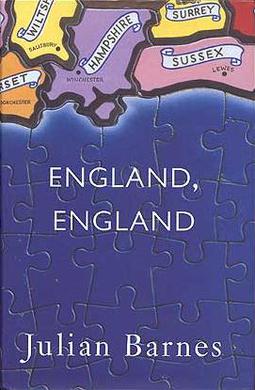England, England facts for kids

First edition cover
|
|
| Author | Julian Barnes |
|---|---|
| Cover artist | Bill Gregory |
| Genre | Satire, farce |
| Publisher | Jonathan Cape |
|
Publication date
|
27 August 1998 |
| Media type | Hardcover |
| Pages | 272 |
| ISBN | 0-224-05275-6 |
England, England is a clever and funny novel by Julian Barnes. It was published in 1998 and was even considered for a big award called the Booker Prize. The book is a type of story called a satire, which means it uses humor and exaggeration to make a point about society. It also has parts that are like a farce, which is a very silly and over-the-top comedy.
The main idea of England, England is pretty wild: what if someone tried to build a copy of England as a theme park? This park would be on the Isle of Wight, a real island off the south coast of England. The story makes you think about what makes a country special. It also explores ideas like national identity (what it means to be English), how traditions are created, and if history and memories are always truly real.
Contents
What is England, England About?
This novel takes a look at what happens when a country's identity is turned into a tourist attraction. Imagine a place where all the famous parts of England are squished together. This includes things like Big Ben, Buckingham Palace, and even a tiny version of the White Cliffs of Dover.
The story starts with a very rich and powerful businessman. He decides to create "England, England" as the ultimate theme park. His goal is to give tourists the "essence" of England in one easy-to-visit spot.
A Theme Park Country
The theme park on the Isle of Wight is designed to have all the most famous English landmarks. Visitors can see a mini Tower of London or a small Stonehenge. They can even experience a "traditional" English village.
The park is meant to be a perfect, simplified version of England. It's like a highlight reel of the country. But the book makes us wonder if this simplified version is truly "England."
Building the Perfect England
Creating "England, England" is a huge project. The businessman hires many people to make it happen. They have to decide what parts of England are most important to include. This process itself shows how people pick and choose what they think represents a country.
The park becomes incredibly popular. People from all over the world flock to see this condensed version of England. It's easier than traveling all over the real country.
What is Satire?
England, England is a satirical novel. Satire uses humor, irony, and exaggeration to criticize something. In this case, Julian Barnes uses satire to make us think about modern society.
He questions how we view our history and traditions. He also looks at how countries market themselves to tourists. The book makes us laugh, but it also makes us think deeply.
Why is it Satirical?
The idea of a theme park England is funny and a bit absurd. This exaggeration is part of the satire. It highlights how some people might prefer a simplified, "perfect" version of a country.
The novel suggests that when you try to package a whole country, you might lose what makes it truly special. It makes us wonder if we sometimes prefer fake versions of things over the real, messy ones.
Thinking About Identity
A big theme in the book is national identity. This means what makes a group of people feel like they belong to a certain country. Is it shared history, traditions, or something else?
The novel asks: if you copy all the famous bits of England, does it still feel like England? What happens to the "real" England when a perfect copy exists?
Real vs. Fake England
As the theme park becomes more popular, the "real" England starts to change. People might visit the park instead of the actual places. This makes the book explore the idea of authenticity.
It makes us think about what is truly real and what is a manufactured experience. The story challenges us to consider what we value about our own cultures and histories.
Invented Traditions
The book also touches on "invented traditions." These are practices or beliefs that seem old but were actually created more recently. Sometimes, traditions are made up to give a country a stronger sense of identity.
In England, England, the theme park creates its own "traditions." This shows how easily people can accept new ideas as old ones. It makes us question how much of our history is truly ancient.
Julian Barnes: The Author
Julian Barnes is a famous British writer. He is known for his smart and thought-provoking novels. Many of his books explore ideas about history, memory, and identity.
England, England is a great example of his style. He often uses humor and clever ideas to make readers think about big questions. He has won many awards for his writing.
Conclusion
England, England is a fascinating and funny book. It uses the idea of a theme park to explore deep questions about what makes a country. It makes us think about history, identity, and what is truly real.
The novel is a great read for anyone who enjoys stories that make them laugh and think at the same time. It encourages us to look at our own world with a critical and curious eye.
 | Bayard Rustin |
 | Jeannette Carter |
 | Jeremiah A. Brown |

